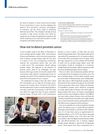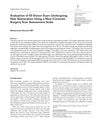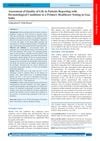 January 2024 in “International Ayurvedic medical journal”
January 2024 in “International Ayurvedic medical journal” Certain Prakruti types are more prone to early male pattern baldness.
 16 citations,
March 2017 in “Bone Marrow Transplantation”
16 citations,
March 2017 in “Bone Marrow Transplantation” Some children who had stem cell transplants developed permanent hair loss, especially when treated with a drug called busulphan.
 6 citations,
November 1988 in “Journal of the American Academy of Dermatology”
6 citations,
November 1988 in “Journal of the American Academy of Dermatology” The document concludes that hair analysis is not good for assessing nutrition but can detect long-term heavy metal exposure.
 4 citations,
August 2021 in “Clinical and Experimental Reproductive Medicine”
4 citations,
August 2021 in “Clinical and Experimental Reproductive Medicine” The 2018 guideline for PCOS suggests new diagnostic criteria and treatments, but recognizes the need for more research.
 January 2024 in “The Journal of Dermatology”
January 2024 in “The Journal of Dermatology” Taking finasteride every other month can still help with hair loss but may be less effective over time compared to taking it daily.
 February 2022 in “Programa de Iniciação Científica - PIC/UniCEUB”
February 2022 in “Programa de Iniciação Científica - PIC/UniCEUB” Both Minoxidil and PRP are effective for male pattern baldness treatment.
 July 2008 in “Expert Review of Dermatology”
July 2008 in “Expert Review of Dermatology” Proper planning for hair transplants is crucial for natural results, with careful patient selection and strategic graft placement being key factors.
 February 2007 in “Lancet Oncology”
February 2007 in “Lancet Oncology” Using a single PSA level to decide on a prostate biopsy is not effective; a more personalized approach considering various factors is recommended.
 7 citations,
June 2020 in “Journal of Cosmetic Dermatology”
7 citations,
June 2020 in “Journal of Cosmetic Dermatology” Turkish women with hirsutism experience lower quality of life, especially those with PCOS, regardless of hair growth severity.
 37 citations,
January 2019 in “JAMA Dermatology”
37 citations,
January 2019 in “JAMA Dermatology” People with Major Depressive Disorder have a higher chance of getting Alopecia Areata, and vice versa; antidepressants may lower this risk.
 20 citations,
October 2018 in “Clinical Drug Investigation”
20 citations,
October 2018 in “Clinical Drug Investigation” Dutasteride does not impair mental function in elderly men with enlarged prostate.
 2 citations,
February 2021 in “International Journal of Environmental Research and Public Health”
2 citations,
February 2021 in “International Journal of Environmental Research and Public Health” Women with PCOS tend to be less optimistic than those without it.
 April 2008 in “Companion Animal”
April 2008 in “Companion Animal” The cat's skin condition was linked to cancer and did not improve with treatment, leading to a poor outcome.
 May 2015 in “Journal of The American Academy of Dermatology”
May 2015 in “Journal of The American Academy of Dermatology” Niosomal minoxidil, when applied topically, increases hair count more than conventional minoxidil solution.
 112 citations,
October 2005 in “Mayo Clinic Proceedings”
112 citations,
October 2005 in “Mayo Clinic Proceedings” Minoxidil and finasteride can slow hair loss and stimulate regrowth, but won't restore all lost hair or reverse complete baldness.
 64 citations,
May 2003 in “Journal of health psychology”
64 citations,
May 2003 in “Journal of health psychology” Women with excess body hair feel psychological distress influenced by societal beauty standards, but distress isn't directly linked to the amount of hair.
 41 citations,
March 2010 in “Psychology Research and Behavior Management”
41 citations,
March 2010 in “Psychology Research and Behavior Management” Using psychological treatments can help manage skin conditions along with regular medical care.
 3 citations,
November 2017 in “The American Journal of Cosmetic Surgery”
3 citations,
November 2017 in “The American Journal of Cosmetic Surgery” The new Cosmetic Surgery Scar Assessment Scale (CSSAS) was found to be simple and effective in evaluating scars from hair restoration surgeries.
 October 2023 in “Han'gug miyong haghoeji/Journal of the Korean society of cosmetology”
October 2023 in “Han'gug miyong haghoeji/Journal of the Korean society of cosmetology” Understanding psychological discomfort in hair loss can improve treatment outcomes.
 November 2022 in “SAS journal of medicine”
November 2022 in “SAS journal of medicine” There's no link between low iron levels and the hair loss condition, alopecia areata.
 October 2019 in “International journal of contemporary medical research”
October 2019 in “International journal of contemporary medical research” Skin diseases have a small to moderate impact on the quality of life of patients in Goa, India.
 May 2020 in “Journal of Asian Medical Students' Association”
May 2020 in “Journal of Asian Medical Students' Association” Hair loss severity is linked to depression, not anxiety, in Filipino men, with older, less educated men with more hair loss at higher risk.
 January 2017 in “Journal of cosmetology & trichology”
January 2017 in “Journal of cosmetology & trichology” Hair loss can cause anxiety and depression, especially in young, single women, and early psychological support is important.
 101 citations,
January 2012 in “Annals of Dermatology”
101 citations,
January 2012 in “Annals of Dermatology” Men with hair loss experience lower quality of life, worsened by factors like age, severity, and treatment history.
 21 citations,
April 2015 in “Psychology Research and Behavior Management”
21 citations,
April 2015 in “Psychology Research and Behavior Management” Cognitive-behavioral therapy is the best treatment for hair-pulling disorder, and combining it with other therapies could improve results.
 8 citations,
June 2020 in “Dermatologic Therapy”
8 citations,
June 2020 in “Dermatologic Therapy” Hair loss lowers quality of life, causing embarrassment, frustration, and sexual rejection.
 2 citations,
January 2022 in “Aesthetic surgery journal. Open forum”
2 citations,
January 2022 in “Aesthetic surgery journal. Open forum” Aesthetic surgery can worsen depression and anxiety, especially in those with existing mood issues.

The study aims to create a model to improve personalized and preventive health care.
 January 2021 in “Journal of Scientific Research of the Banaras Hindu University”
January 2021 in “Journal of Scientific Research of the Banaras Hindu University” Lifestyle changes and medical treatment can help manage PCOS symptoms in young adults.
 32 citations,
January 2017 in “Patient Preference and Adherence”
32 citations,
January 2017 in “Patient Preference and Adherence” Alopecia affects patients' quality of life, with younger patients and longer-lasting hair loss experiencing greater impact.






























